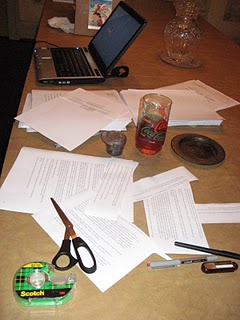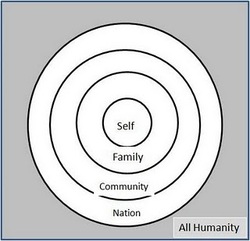Assignment:
Today, we'll write down our burning questions. (page 1)
By next Monday:
We'll fill in page 2 and turn it in.
Before spring break, we explored the idea of burning questions--now we want to get them down and start exploring--will our beliefs about our topics change with new facts and new opinions from other people? What do we believe should be done about about the concerns that we have? We'll have some people in to talk with us about our topics soon...In the meantime, we'll be looking for some facts and opinions in newspapers, books, magazines and on the internet.
Assignment: Today, we'll write down our burning questions. (page 1) By next Monday: We'll fill in page 2 and turn it in. We've been talking about how good writers "show" more than "tell." In a good piece of writing--there is more showing--but the telling is important, too. Another way to think about this: writing "in scene" and writing "summary."
In our letters to our legislators about saving school funding for teaching assistants, you wrote about a moment with a teaching assistant--about a specific point in time or event that made you feel assistants or tutors are important to you, your school, and your education. You created a word picture so that people in Raleigh can "see" what happened. That paragraph is called a "scene." Think of a play. In a play, something is happening and the characters are reacting. This is a scene. It's as if you (the writer) and your reader or audience is watching something happening right then. Then, there is summary. Summary is when you offer a point of view or look back and say what you thought about something or write a quick couple of sentences to get the reader to the next "scene." This week, I'd like for you to take the writing you've done about your issue and put it into the format that I give you (see document page). I've included an example of a This I Believe essay and pointed out what the writer is doing--we did this in class together--but this is something you can keep and use as you write your own essay. Assignment: Using the organizer I've given you, write an introduction, then plug in the writing you've done so far into the "scene" paragraph. You'll have to look at what you wrote first, then what you wrote after you received questions and comments from your classmates and from me. Choose the best of it for your middle paragraphs and feel free to add something you didn't think about before. Then write your conclusion. Due: Friday If knowing your own opinion and your own feelings about issues is the place to start writing to change the world--the second step is finding out more. Lots of times, we think that the big issues are far away from us--like the war--or far in the past, like the discrimination against people of color and the civil rights movement. A writer who wants to change the world NOTICES what is happening--by paying attention. The local newspaper, the local radio stations and television stations, and internet news sites for children are all good places to learn about what is going on--and so is talking with your family, your teachers, and your friends. We discover that while the war might be far away in physical distance, its impact is felt right here in the mountains. We wish that racial discrimination was in our past, but we discover that it's not. These are just two issues of concern--what else might you find?
Assignment: This week, pay attention and notice. Choose an issue that concerns you and write a reflection on your blog. A reflection is simply a statement about how you feel and what you think about the issue and WHY. You might choose an issue we've discussed in class, or you might choose an issue that you read about in the local paper or heard about on the news. The reflection should be at least one paragraph. Now that you have spoken with a partner about the piece you would like to "re-envision," written down some answers to questions that popped up, cut apart your draft, organized it on a larger piece of paper and glued it down--it's time to check the TRANSITIONS!
Transitions are merely words or groups of words that move a story, a letter, an essay, a research paper from one part to the next. I think of them as the merge ramps for when cars get on a highway. Good transitions go beyond just saying- And or Then. Below is a list of transition words- that can be used to move from one idea to the next, one paragraph to the next-- Assignment Look at the piece you are re-envisioning with a partner. Ask them to circle the places where he or she feels like there needs to be better transition. Add transition words and sentences (right on the draft) that will help your reader to merge smoothly throughout your writing! Transition Words Words that can be used to show location: above behind by near throughout across below down off to the right against beneath in back of onto under along beside in front of on top of among between inside outside around beyond into over Words that can be used to show time: while first meanwhile soon then after second today later next at third tomorrow afterward as soon as before now next week about when suddenly during until yesterday finally Word that can be used to compare two things: likewise also while in the same way like as similarly Words that can be used to contrast two things: but still although on the other hand however yet otherwise even though Words that can be used to emphasize a point: again truly especially for this reason to repeat in fact to emphasize Words that can be used to conclude or summarize: finally as a result to sum up in conclusion lastly therefore all in all because Words that can be used to add information: again another for instance for example also and moreover additionally as well besides along with other next finally in addition Words that can be used to clarify: that is for instance in other words  Photo by Cynthia Leitich Smith, children and young adult author. Click the photo to visit her site. Oh, no! Revision! Anything but revision! If that's how you feel about revision then let me take a moment of your time and see if I can change your mind.
First of all, I am so glad that I don't have to be perfect. So glad that I can write down a first draft and know that I can come back and make changes. The truth is, every piece of first draft writing is like a lump of clay that a potter puts on a wheel. It then needs to be shaped. Fortunately, a piece of writing can ALWAYS be revised--unlike a piece of pottery that gets fired into a permanent shape. Even PUBLISHED writing can be revised by the author. I like to think of revision as re-envisioning my writing. I write a draft and then get with some of my writing buddies and ask them to read it. I want them to help me dig deeper by asking questions. I might have a question to ask them--like, Do you think that last sentence feels right? They might then give me a suggestion. I know that as an author, I can accept the suggestion or not--it's my choice. When I go back to do a second draft, I look at the questions and the suggestions and I write about each one. Then, even though I have a computer which can cut and paste, I like to cut apart my drafts and move them around, paste them into a new order. I'm not the only one who does this. Many authors do...including Cynthia Leitich Smith. I've included a photo she took after she cut and pasted to dig deeper into her new novel. Here's a tip: even if you glue things down--you can always cut up that piece of paper!I love being surprised by what my second draft looks like--it's like watching a bean stalk grow toward the sun--and I don't mean just in length but in strength--finally flowering. I'm not yet at the point where my stalk or writing will actually produce--that requires a final polishing and editing--but more about that in the future~ Assignment: This week, choose a piece of writing to re-envision. You've been writing ALOT. Make a choice from:
A good writer, particularly one who wants to write to change the world, understands his or her own world view. What is a world? What is a view? Well, a look in the dictionary tells us that world is a noun and can mean: 1 : the earth and all the people and things upon it 2 : people in general : HUMANITY 3 : the system of created things : UNIVERSE 4 : the concerns of the earth and human affairs 5 : human society 6 : a class of persons sharing a common interest or activity 7 : a part or section of the earth and the people who live in it 8 : the scene of one's life and action The word view,in this instance, is a noun and can mean: 1: the act of seeing or examining 2 : OPINION 3 : all that can be seen from a certain point 4 : range of vision So, when we say world view, we mean the way that we see the many worlds we live in. There are many influences on how we see our worlds--our heritage, our family, where we live, what experiences we've had, what we like to do, our friends, our teachers, the type of government we have, even the type of home we live in! Knowing what influences each one of us can help us to make choices about how we write to influence others.  Assignment:
This week, use the World View worksheet and map your worlds and influences. You'll already have had some time to do this and some discussion about this during our Monday class. Then, write a poem--using the guide I've provided--and post it on your blog. It is a first draft. Over the next 2 weeks, I would like for you to visit the blogs and read everyone's poem.
Where I'm From By Scott I am from Texas where deep in the heart lies Austin. I am from the sunny Saturday afternoons of Texas Longhorn football games. I am from sports and the lessons that I learn from these games I play with all my ability and enjoy the victories. I am from my family, friends, and awesome food. I am from my grandmother's warm pies and my parents cooking, from which I grew to be a large boy. I am from Texas barbeque which smells and tastes like none other. Although I cannot have it right now I can still remember. I am from Tennessee where I live at the Foothills of the Smokies and enjoy hiking on clear days. I am from lessons in literature and the sounds of a saxophone. I am from the try your hardest and never give ups. I'm from my hard work and the present as I continue on life's journey. |